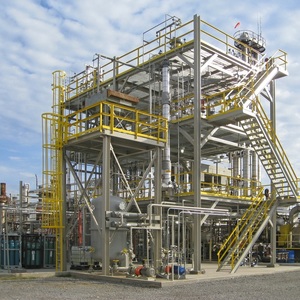Gevo's wood-derived jet fuel to be used in test flight

Gevo Inc.
June 5, 2015
BY Gevo Inc.
Gevo Inc. has announced a breakthrough to its fermentation technology that will allow it to produce isobutanol from cellulosic feedstocks such as wood waste which can then be converted into Gevo's alcohol-to-jet fuel.
Gevo currently makes isobutanol from corn at its plant in Luverne, Minnesota, but its process has always had the flexibility to adapt to other feedstocks. The process announced today uses forest residuals—the wood scraps that are left over from logging operations—providing a value creating recycling opportunity for waste wood that is traditionally left in the forest, potentially becoming a forest fire hazard. The company has previously announced the testing and use of its alcohol-to-jet fuel derived from its corn-based isobutanol in conjunction with major airline partners and the U.S. military.
Gevo has adapted its patented Gevo Integrated Fermentation Technology (GIFT) to convert the cellulosic sugars from wood into renewable isobutanol. Gevo then uses its patented hydrocarbon technology to convert the cellulosic isobutanol into alcohol-to-jet-synthetic paraffinic kerosene (ATJ-SPK) fuel.
Advertisement
Advertisement
The company's cellulosic isobutanol production will be conducted at a demonstration facility in St. Joseph, Missouri, that the company jointly operates with ICM Inc. The ATJ-SPK will be produced in Silsbee, Texas, at the demonstration facility the company operates with South Hampton Resources.
Gevo is a member of the Northwest Advanced Renewables Alliance and is providing the organization with technology to enable the commercial scale processing of cellulosic sugars from wood waste into valuable products. The cellulosic jet fuel made using Gevo's technologies will be used in a 1,000-gallon renewable fuel demonstration test flight that NARA announced yesterday. Gevo's isobutanol and ATJ-SPK technologies are both planned to be licensed by NARA as part of this project.
Advertisement
Advertisement
"There are significant economic and environmental benefits of renewable jet fuel, which makes it a great market for Gevo. This announcement demonstrates the flexibility of our technology and reinforces our technology leadership," said Pat Gruber, CEO of Gevo Inc. "The next two milestones for renewable jet fuel are the approval by ASTM and the scheduled commercial test flights. Our team is actively engaged in both of these activities."
"We're encouraged by Gevo's work with the NARA team in converting Pacific Northwest forest residual biomass into jet fuel, and look forward to working with them on this test flight and in the next phases of the commercialization of this technology," said Ralph Cavalieri, director of NARA.
NARA is a five-year project supported by the USDA, National Institute of Food and Agriculture, and is comprised of 22 member organizations from industry, academia and government laboratories. Its mission is to facilitate development of biojet and bioproduct industries in the Pacific Northwest using forest residuals that would otherwise become waste products. A key task of the project is to evaluate the economic, environmental and societal benefits and impacts associated with such
Related Stories
EFT licensee Highbury Energy Inc. and WBCEC are advancing a CAD$210M Indigenous-led biomass-to-fuels project in Fort Frances, Ontario. The facility will use woody biomass to produce SAF and renewable diesel.
The U.S. EPA on Sept. 12 released a proposed rule to end the Greenhouse Gas Reporting Program. If finalized, the proposal would remove reporting obligations for most large facilities, all fuel and industrial gas suppliers, and CO2 injection sites.
The Coalition for Renewable Natural Gas and American Fuel & Petrochemical Manufacturers in September filed separate lawsuits challenging the U.S. EPA’s final rule to partially waive 2024 cellulosic blending obligations under the RFS.
Provectus Biofuels Inc. on Sept. 11 announced it has signed a non-binding letter of intent with a regional Alberta airport that sets out indicative terms under which both parties intend to negotiate a definitive long-term offtake agreement for SAF.
Worley has been awarded a contract by Preem for FEED verification for the planned conversion of the ICR plant at the Lysekil refinery in Sweden from conventional diesel production to the production of renewable diesel and SAF.
Upcoming Events










